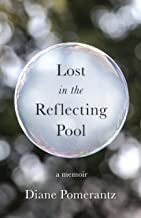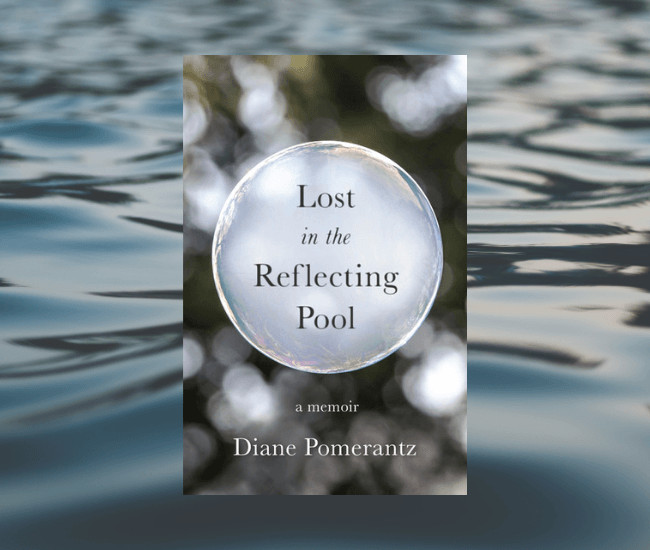Lost in the Reflecting Pool
What's It About?
Falling madly in love is a thrilling adventure. Happiness fills every pore. Colors are brighter, the air is sweeter. A rose-colored film wraps itself around your vision. It’s wonderful. Until it’s not.In psychotherapist Diane Pomerantz’s heartfelt memoir, Lost in the Reflecting Pool (She Writes Press), the insidiousness of emotional abuse intertwines with her story of love, betrayal and her search for identity.
Diane begins her tale of revelation from the start of her relationship: 1981 Baltimore. Diane takes readers inside the happiness that is her life after she meets charismatic psychiatrist Charles Mandel. Diane knows Charles is quirky, sometimes saying the oddest things. She calls it his “crazy-making.” But don’t all people have one or two idiosyncrasies?
Diane’s heart just can’t accept the niggling unease inside her brain. She rationalizes his eccentricities. “Now I see so much more clearly how willing I was to put Charles and the relationship before anything else, even before myself. Isn’t that what so many women do?”
Despite her periodic apprehension, Diane marries Charles in 1985. After a whirlwind honeymoon, their lives settle into what will become a game of Dr. Jekyll and Mr. Hyde. One evening Diane is cranky after having a bad day. Instead of Charles trying to soothe her, he criticizes Diane. In that ominous moment, she has an epiphany. “If I am ever really sick, he won’t be able to be there for me.”
As Diane and Charles try to have children, it becomes clear there are problems. Diane requires several surgeries, one requiring lengthy hospitalization. Diane can’t believe Charles ignores her pleas to be with her at the hospital. His patients come before his relationship with her. “He had no clue about being there for anyone. He had no clue about love or compassion; it was as if there was nothing inside him. He was an empty shell.”
But Charles woos her with flowers and loving attention, and Diane forgives his “craziness.” Surely a man who can be so affectionate has redeeming qualities that outweigh his periodic neglect? She once again pushes aside her misgivings.
“It would be quite a while before I allowed myself to see Charles’ criticalness and need for control…. However subtle they might have been, he always delivered his blows with the deft strokes of a surgeon’s scalpel.”
Diane’s diagnosis of breast cancer in 1998 begins a long period of fear and anguish. Charles’ patients come before Diane’s need to have him by her side as she undergoes many surgeries and treatments. He is never there for her. Charles’ need for control and attention leads to a bitter resentment towards Diane. She even discovers a notation about her in his journal: “The only reason it’s good she hasn’t died is so that she can provide child care…”
Charles’ desire to injure her with cold and callous comments seems to heighten during the time she needs him most.
“I was telling him something about wanting to find the preciousness in each day. He looked up from his plate and newspaper and with cold detachment said, ‘Is this cancer thing all we’re going to talk about for the next year? How about before you start talking, ask if I want to talk about it?’”
It will take Diane almost twenty years to admit to herself that Charles is a narcissist, tearing everyone around him apart to make him feel better about himself. He is a master manipulator. Diane finally realizes her life will be better without Charles. She learns to trust her instincts and strength, ultimately coming to the understanding that Charles’ manipulation and lack of compassion can never be explained.
“Those first few years after the separation were a quagmire filled with strangling, choking vines… all I wanted was clarity. I believed that the pain would cease only if I could understand [Charles]. My own sense of self had been nibbled away at for years and eventually devoured. My insides were a constant, aching, and echoing void.”
“Letting go of the need to have answers to unanswerable questions—accepting that there were things that were, that are, and that will always be beyond my control—has allowed me the freedom to move on, to find myself once again.”
Lost in the Reflecting Pool depicts how emotional abuse can surreptitiously infiltrate a person’s mental stability and self-esteem. Unlike a punch to the face or a push against the wall, it creeps in when you aren’t expecting it—when you don’t even realize it’s happening—wearing down your confidence word by word until there is little left but doubt and self-loathing. Bruises heal faster than emotional scars from head-games.
Despite these traumatic personal wounds, Diane learns to believe in herself.
“I have control over my choices for the future only by seeing the reality of the past as it was, in its stark vividness…. Understanding… that feelings shift and change has helped me to know that even on the darkest of days, the sun will always shine again.”
Now when Diane looks at her reflection in the mirror, she sees a self-confident woman who embraces the beauty of each day. Regardless of the dark battles she has faced and the hardships she may still encounter, she will stand up and come out into the light, making space for brightness to come to her and her children.
Lost in the Reflecting Pool is available for purchase.
Learn more about Diane on her Author Profile page.
Buy this Book!
Amazon




